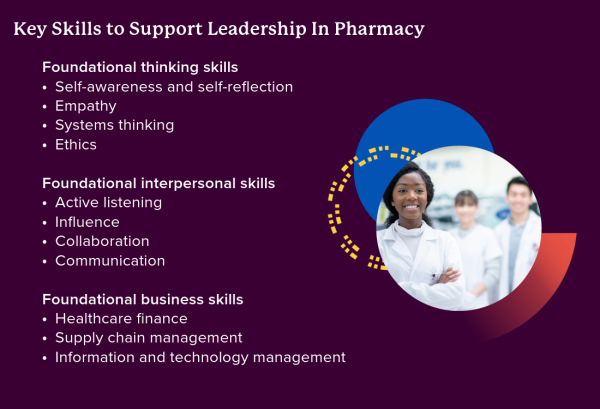
Pharmacy Leadership: The Evolving Pharmacist Role

As the Profession Evolves, Pharmacists Must Learn to Be Leaders
The role of the pharmacist has changed significantly. Now more than ever, it's important for pharmacists to learn how to be effective leaders. Pharmacists are uniquely positioned to engage other healthcare leaders in providing synergistic care because pharmacists find themselves at the intersection of many professional disciplines. With an expanding scope that goes beyond traditional dispensing duties, pharmacists now play a pivotal role in patient-centered care and interdisciplinary collaboration. As the healthcare landscape embraces a more integrated approach, pharmacy leaders can drive collaborative efforts and help navigate the transformation to comprehensive healthcare delivery.
The journey to high-quality, equitable healthcare through provider leadership
It's an understatement to say that healthcare in the United States is complex. The complicated elements of healthcare are less of an amalgamation and more of a loose cluster of independent variables. Access to care, assessment and treatment, data and information, care delivery, user experience, resource management, and more – each vertical comes with a unique perspective, goals, and internal complexities. Current literature posits that the vision of the "healthcare machine" must pivot to that of a unified and adaptive healthcare system1. This new system must focus on agreeing on a singular outcome, with each machine component working to achieve that outcome.
What does that pivot mean to healthcare providers and those who ensure their educational preparation? To start, it means that healthcare leaders must be prepared with the skills and knowledge to participate in systems thinking. As educators, we must engage in anticipatory and prospective thought. We have an obligation to understand the horizon and set a course to ensure the talented and dedicated students in our charge are best prepared to meet the changes that lie ahead. Leadership in each discipline must be armed with the ability to adapt, collaborate, communicate, innovate, and consider holistic solutions.
Pharmacists are uniquely positioned to lead this journey
Pharmacists are one such profession whose course has the flexibility for change. Positioned at the crossroads of various healthcare disciplines, they have a unique opportunity to catalyze their collective efforts on a daily basis. This collaboration is an essential tool in the shift to a unified healthcare system.
A prime example of critical leadership from pharmacy was demonstrated in the early stages of the COVID-19 pandemic, as treatment regimens were rapidly being established, evaluated, and adapted - pharmacists played an integral role and demonstrated their proficiency in providing critical analysis of research. The speed at which real-world data and research literature change recommendations and treatment modalities requires concentrated effort. Pharmacists' doctoral education preparation ensures they have a robust knowledge of research design and analysis, making them well-positioned to interpret these sources and lead best practices. This will continue to be an asset to future healthcare system design.
Navigating the landscape
Healthcare must be delivered in every small town and big city across the nation. Each setting is unique in geography, population density, and social determinants of health. Each is nuanced with tradition, culture, and groupthink mentalities. As educators, choosing the route means matching the innovation in program models and delivery to the diverse and vast landscape that the professionals must serve. The traditional doctoral educational path is rigid, often drawing pharmacy students to large cities to complete their on-campus programs and clinical experience.
However, there is a necessity to have pharmacists remain loyal to their home communities, especially those in rural and remote areas, and be prepared to lead them through the complicated healthcare machine and into the complex adaptive healthcare system of the future. Innovations such as distance and hybrid PharmD program designs allow students to pursue a pharmacy degree without relocating from their home community. This helps ensure that their expertise can remain in their local communities upon graduation, leading those who might otherwise be underserved.
In rural areas, pharmacies can fill the gaps left by shortages in other health coverage when clinics, hospitals, and health systems are few and far between. Embedded within and frequently interacting with the community, the scope of the pharmacist's role is expanding to foster patient-centric, equitable care.
"Studies show that 9 in 10 Americans live within 5 miles of a pharmacy, and patients with greater health needs visited their community pharmacy an average of 35 times per year compared to four visits to their primary care provider and nine visits to specialists."
– Pharmacists Fill Needed Health Care Gap for Rural Americans, Pharmacy Today
Plotting the course
As we consider this journey to a complex adaptive healthcare system, it's imperative to identify key waypoints that serve as milestones. These milestones not only define the pharmacist's professional trajectory but also underscore the dynamic nature of their responsibilities.
- Defining the pharmacists' spectrum of responsibilities: The pharmacist's role is professionally defined as promoting and supporting the safe, effective, and rational use of medicines. How this is executed varies and is beginning to transform even more.
- Providing an understanding of medication
- Informing judicious use
- Leading behavior and prescribing changes
- Educating patients on medication safety
- Recognizing pharmacists as critical contributors to patient care: The World Health Organization (WHO) and International Pharmaceutical Federation (FIP) have issued statements that propose pharmacists are critical to improving patient care and drug therapy outcomes - a pressing need as drug-related morbidity and mortality continue to rise.
- Leveraging pharmacists' leadership in medication-related processes: Doctorally prepared pharmacists have the potential to optimize orders and ensure the procurement, allocation, and distribution of medication. The pharmacist's leadership abilities and advanced understanding of medication will be critical in ensuring these efforts are ethically led.
- Acknowledging the influence of pharmacists in prescribing habits: Pharmacist-led programs that battle the global health challenge of antimicrobial-resistant (AMR) organisms have proven highly successful. These programs include surveillance, communication of proper dose and duration, education of the prescribing community on appropriate indication and antibiotic selection, and influence of the healthcare community as a whole.
Powering the vessel
As previously discussed, the journey to create an adaptive healthcare system will take talented professionals who possess more than just clinical knowledge. Advanced leadership skills and systems thinking will also be necessary to power change. Student pharmacists will need to hone these skills to be key contributors, and leadership competencies for pharmacists will need to be delivered by programs with diverse designs and innovative accessibility.
Effective and well-known leadership styles - transformational, authentic, and service leadership - all share common elements. All leaders, whether formal or informal, have influence over others. Their ability to positively influence individuals, teams, and the healthcare system will depend on how well they understand and develop foundational skills in crucial areas such as critical thinking, interpersonal communication, and business.
Knowing what lies on the horizon
Pharmacy leaders will influence the ethical distribution of pharmaceuticals, the judicious use of medication, and prescribing conventions, just to name a few. They will need to consider micro and macro elements, from the uniqueness of individual patient presentations and the behaviors that drive their health decisions to a knowledge of policy and pharmaceutical companies. They will participate in and drive pharmaceutical and medical research. And, positioned at the crossroads, they will have the opportunity to lead patient-centric interdisciplinary collaboration in the transformation of healthcare.
As educators, we must ask ourselves: Are our pharmacy programs up to the challenge of plotting this course? Are our offerings agile and innovative enough to ensure diversity and just access? Do they contain the appropriate mix of leadership, systems thinking, and clinical experiences to ensure graduates can navigate the journey to a complex adaptive healthcare system?
Sources
- Committee on Quality of Health Care in America, Institute of Medicine. (2009). Crossing the quality chasm: A new health system for the 21st Century. National Academy Press.
Editor’s note: This article was originally posted in May of 2016 and has been refreshed for relevance and accuracy.
